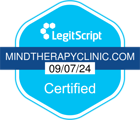Because trauma experience is different for everyone, treatment is personalized uniquely for each client.
Mind Therapy trauma treatment program serves adults whose symptoms are severe enough to cause significant impairment in the activities of daily living, including work, school, family, and social functioning. These symptoms include:
Intense emotion and reactivity
Severe fear, anxiety, or depression
Trouble functioning at home or work
Avoidance behavior
Disrupted eating and sleeping patterns
Intrusive thoughts or images
Inability to form close, satisfying relationships
Terrifying memories, nightmares or flashbacks
Emotional numbness
Addictive use of alcohol or drugs
Unrelenting guilt, shame, self-blame
Feelings of hopelessness
Confusion, difficulty concentrating
Withdrawal and disconnection from others
Obsessive thought patterns that may manifest as compulsions, addictions, and codependency
Those struggling to recover from all manner of trauma - physical, emotional, spiritual - often report a loss of sense of integrity and wholeness. Mind Therapy Clinic’s treatment seeks to empower our clients to resume life with a restored sense of self.
A comprehensive set of trauma treatment services
Individual Trauma-Informed Psychotherapy
Cognitive Behavioral Therapy (CBT) including Prolonged Exposure (PE)
Sensorimotor Psychotherapy
Somatic Experiencing Therapy
Eye Movement Desensitization and Reprocessing (EMDR)
Mindfulness-Based Psychotherapy
Family Therapy
Personal Care Managers
Psychiatric Medication Management
Cognitive Rehabilitation
Neurofeedback
Group Therapy (focusing on maintaining stability, stress reduction, emotional regulation, interpersonal relationship, and coaching)
Why Mind Therapy Clinic's trauma program is unique.
Mind Therapy Clinic provides comprehensive, personalized, and integrated treatment of trauma through our range of outpatient services, Intensive Outpatient Program, and Partial Hospitalization Program. Care is tailored to clients’ needs, specific diagnoses, types of issues, and severity. Clients can move between different levels of treatment depending on their needs as well as different types of trauma therapy as appropriate. We have an exceptional staff of experienced physicians, nurse practitioners, doctoral-level psychologists, and master’s-level therapists specializing in a full range of evidence-based trauma treatments.
Treatment focuses on:
Physical and psychological treatments aimed at calming the nervous system
Identifying and working through the psychological sources of trauma
Desensitization to painful triggers
Developing effective coping skills and strategies
Improving supports through more effective interpersonal communication and more functional family systems
How to talk to kids about PTSD.
If you have kids, they may notice the changes in you or your loved one, too.
And if they don’t understand what’s going on, they may be scared or confused. You and your loved one can help by talking to them about PTSD.
Share age-appropriate information. Tell them what PTSD is and the challenges it’s causing, but avoid any details that might be too graphic or scary. Older kids may also want to know what they can do to support your loved one.
Tell them it’s not their fault. Make sure your kids know that they didn’t cause your loved one’s PTSD — and it’s not their job to fix it.
Encourage them to share their feelings. Check that your kids understand what you’ve told them, and ask if they have any questions. Make sure they know they can talk with you about their own worries and fears. Express hope for the future. It’s important for your kids to know that there are treatments for PTSD that work — and that you believe things will get better. Let them know that your family will work together to support your loved one.
Consider family therapy if your family is having a hard time talking. They can help you and your family learn how to share tough emotions, support each other, and cope with PTSD.
Trauma-Informed Group Therapy
Post Traumatic Growth Group
Mindfulness-Based Therapy
Dialectical Behavior Therapy (DBT)/STAIR Skills
Self Compassion Around Trauma
Anxiety Group
Stress and Addiction
Acceptance and Commitment Therapy (ACT)
Experiential Psychotherapy
Men’s Psychotherapy Group
Women’s Psychotherapy Group
Interpersonal Skills Group
Process Group
Emotions and Compulsions
Restorative Movement
Healthy Living Group
Insurance information
Does my insurance cover trauma treatment program?



